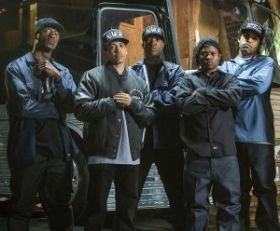 “Zeitgeist” is a popular word that gets thrown around by movie reviewers and bloggers when talking about movies that feature hot-button or current event topics. The Social Network was a “zeitgeist” movie. It reflected who we were as a society, remember that?
“Zeitgeist” is a popular word that gets thrown around by movie reviewers and bloggers when talking about movies that feature hot-button or current event topics. The Social Network was a “zeitgeist” movie. It reflected who we were as a society, remember that?
Well, it’s time to look a little deeper than Facebook.
Movies in recent years have been reflecting more than our technological advancements. They have been reflecting, quietly and potently, without our even really noticing, the number-one cultural and social chasm in America: racism. If we are to be really honest, racism, in all its many forms, is, has been and continues to be the real zeitgeist in this country—it reflects who we have been and who we are as a country and as a society and represents the #1 social issue that needs to be addressed that we have continually had trouble addressing. From Ferguson to Baltimore to Zimmerman to Black Lives Matter, it is still very much a part of our everyday lives, and, whether you have really noticed or not, Hollywood has not been ignoring it. Some of the best movies of the past few years have dealt, implicitly or explicitly, with racism: Selma, 12 Years a Slave, The Help, Lincoln, Django Unchained, and, currently airing on HBO, the critically-acclaimed mini-series Show Me A Hero, starring Oscar Isaac, which tells the true story about the battle to build court-appointed low-income housing in Yonkers in the 1980s. I’m watching this and I had no idea this even happened. There are so many stories like this that need to be told, and still so many more.
Which is why, for both biographical, historical and cultural purposes, which is nothing to say of artistic, the new film Straight Outta Compton is not only important, but timely.
And damn if it isn’t really good too.
For those who might not know, Straight Outta Compton is a “making of the band” story. The setting is 1986, Compton, California, otherwise known as “the Hood.” To be a young, black man and to survive here is to know many things, including gangs, drugs, violence and police harassment and brutality on a regular basis. These things were a way of life for 5 friends who come together to put a voice to the injustice. Although they didn’t invent rap music, this type of angry “gangsta rap” had never been heard before with such brutal, pointed and raw honesty (and language) and it highlighted the divide between the white power structure and the underserved black population, much to the dismay of the former. The group was called N.W.A., and they sparked a revolution, musically and culturally, that continues even today.
The three most famous members of N.W.A., Dr. Dre, Eazy-E and Ice Cube, are played to near-perfection by Corey Hawkins, Jason Mitchell and O’Shea Jackson, Jr. I can easily say I’ve never seen a movie before that features three unknown actors as compelling and enjoyable to watch as these three. Each one, in these roles, inhabits their role with total abandon and believability and when they are onscreen, I never want them to leave—until I see the next scene when they hand it off to each other. Hawkins, Mitchell and Jackson (Ice Cube’s son in real life) are just so good together and individually that it makes this really long movie (2 ½ hours) fly by. What also helps is all the music and the great pace, editing and cinematography, courtesy of editors Billy Fox and Michael Tronick and Oscar-nominated cinematographer Matthew Libatique (Black Swan). But, mostly, it is director F. Gary Gray who makes it all work with a perfect tone, which never gets bogged down by too much heavy-handedness, too much preachiness, too much in-your-faceness, too much swagger, or too much confidence. Trust me, all of this could have easily happened with this film. This is a movie about a revolution, about music that put voice—a very angry voice—to injustice. It could have gone wrong in so many ways. Especially when you see that it is produced by two of the movie’s subjects, Dr. Dre and Ice Cube themselves. Making a movie about yourself is a tricky thing. How honest will you be? How ugly will you allow yourself to be painted?
Alas, I do wonder what film might have been made without the involvement of the real people—how much was held back, what wasn’t shown or revealed that should’ve been—but that’s not what I’m looking at. I’m looking at what did make it to the screen. And what did make it to the screen is an absolutely captivating, high-energy, well-made, high-octane film that takes yet another important snapshot in our nation’s cultural history and puts it out there for everyone to see. We cannot forget or sweep away the impact of art in the advancement of social and cultural change. N.W.A. started the dialogue that movies like Straight Outta Compton are continuing to keep on our tongues. It is an important conversation to continue having and this is a really good movie. Period.
